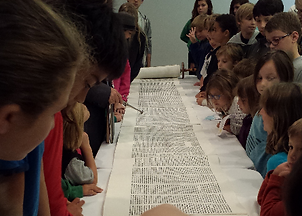Make a Lasting
Contribution With
Planned Giving.
Click on Logo for
Details!
The Jewish calendar is filled with holidays celebrated in very different ways by Jews around the world. Some holidays reach back to antiquity. Others have evolved to encompass modern traditions and cultures.
At the Congregation for Humanistic Judaism we mark these holidays and others as yet another way to strengthen our commitment to our secular Jewish culture.
Our approach to holiday celebrations is guided by our Humanistic philosophy. We enjoy examining at the true origins of holidays and understanding their significance to Jewish culture and history. We enjoy gathering for the holidays, incorporating traditions that are consistent with our philosophy.
Holiday services are often multi-generational. We endeavor to pass along important, meaningful Jewish holiday customs and to create new traditions to enhance our lives.
HOW WE CELEBRATE...
Rosh Hashanah & Yom Kippur
At the Congregation for Humanistic Judaism, we see Rosh Hashanah (the Jewish new year) and Yom Kippur (the Day of Atonement) as opportunities for individual and communal renewal and reflection. Like other congregations we offer services. But our services do not focus on worship or praise, but on the power of people and our need to explore our lives and how we can live fulfilled and responsible lives. Our services feature traditional components such as the Shofar and many familiar tunes.
Sukkot & Simchat Torah
The autumnal holidays of Sukkot and its conclusion, Simchat Torah, are usually recognized on the Friday evening closest to the festivals. At Sukkot, an ancient harvest festival, we decorate our congregation's Sukkah and reflect upon the fragility of nature. Simchat Torah, when traditional Jews conclude and begin the Torah reading cycle, is considered by Humanistic Jews a time to recognize the power of Jewish literature at shaping our people's consciousness.
Chanukah
Chanukah is both a commemoration of the ancient war of the Maccabees and a Jewish winter solstice festival. We celebrate by lighting the menorah, playing dreidl and eating the traditional food. We also use it as a time to examine the values of the ancients and in what ways we are similar and different.
Purim
Purim centers around the Book of Esther, the most secular narrative in the Jewish Bible. It is a lighthearted spring bacchanal that features the story of a Jewish queen who must halt a plot to kill the Jews. We celebrate it on the nearest Friday night along with a costume party. Our Temple School hosts a fun Purim Carnival each year.
Passover
Our second night Temple seder is a highlight each year. Using a contemporary and relevant Haggadah prepared for us, we consider the ideas of freedom throughout history. Passover is a wonderful opportunity to retell the ancient biblical legend of the exodus and to remember the real suffering of Jews and so many others in ancient and modern times.
Shavuot
Shavuot is recognized on the nearest Friday night. Though traditional Jews commemorate it as the day that the Jews received the Torah at Mt. Sinai, Humanistic Jews prefer to return to its original roots as a harvest festival. It is also an opportunity to consider the appropriate uses of traditional literature in a modern world.
HOLIDAYS








